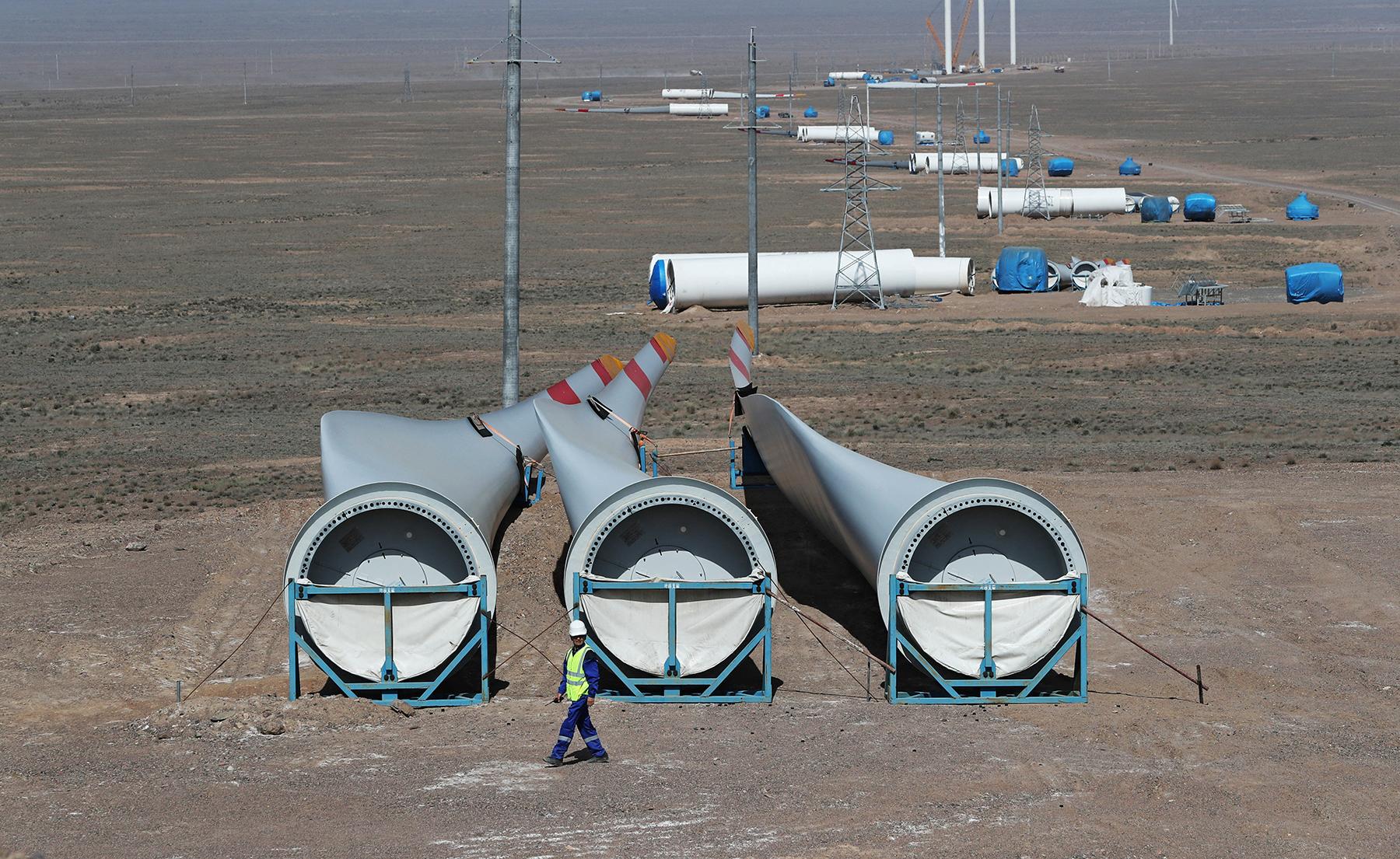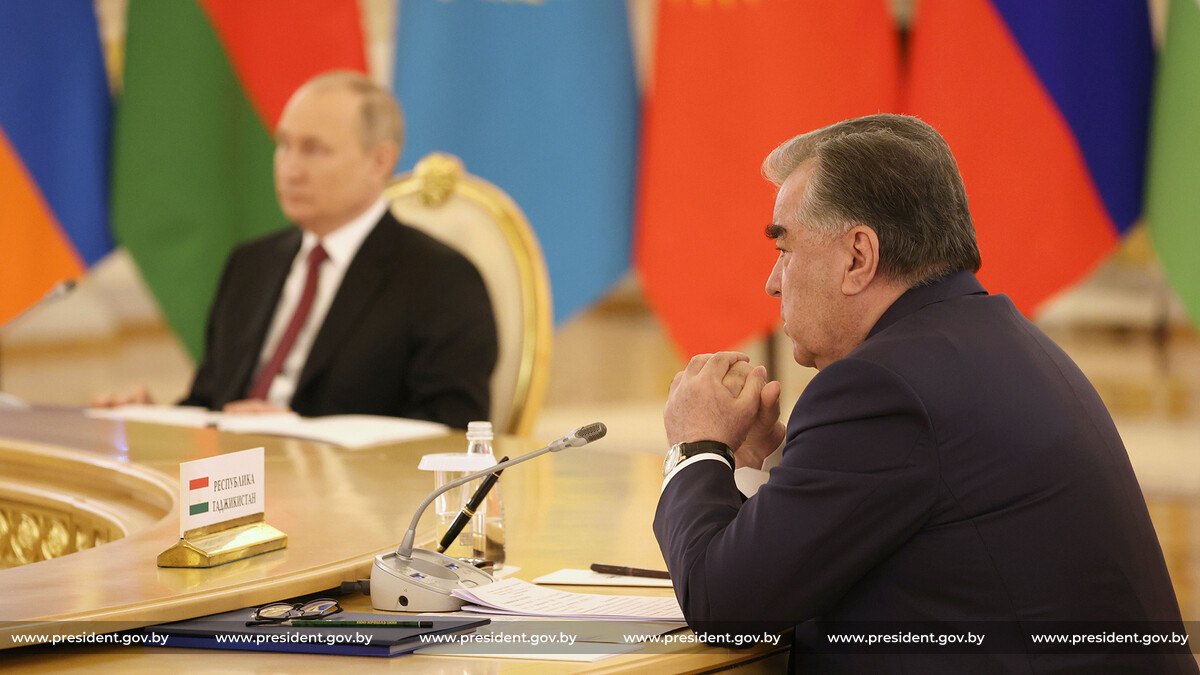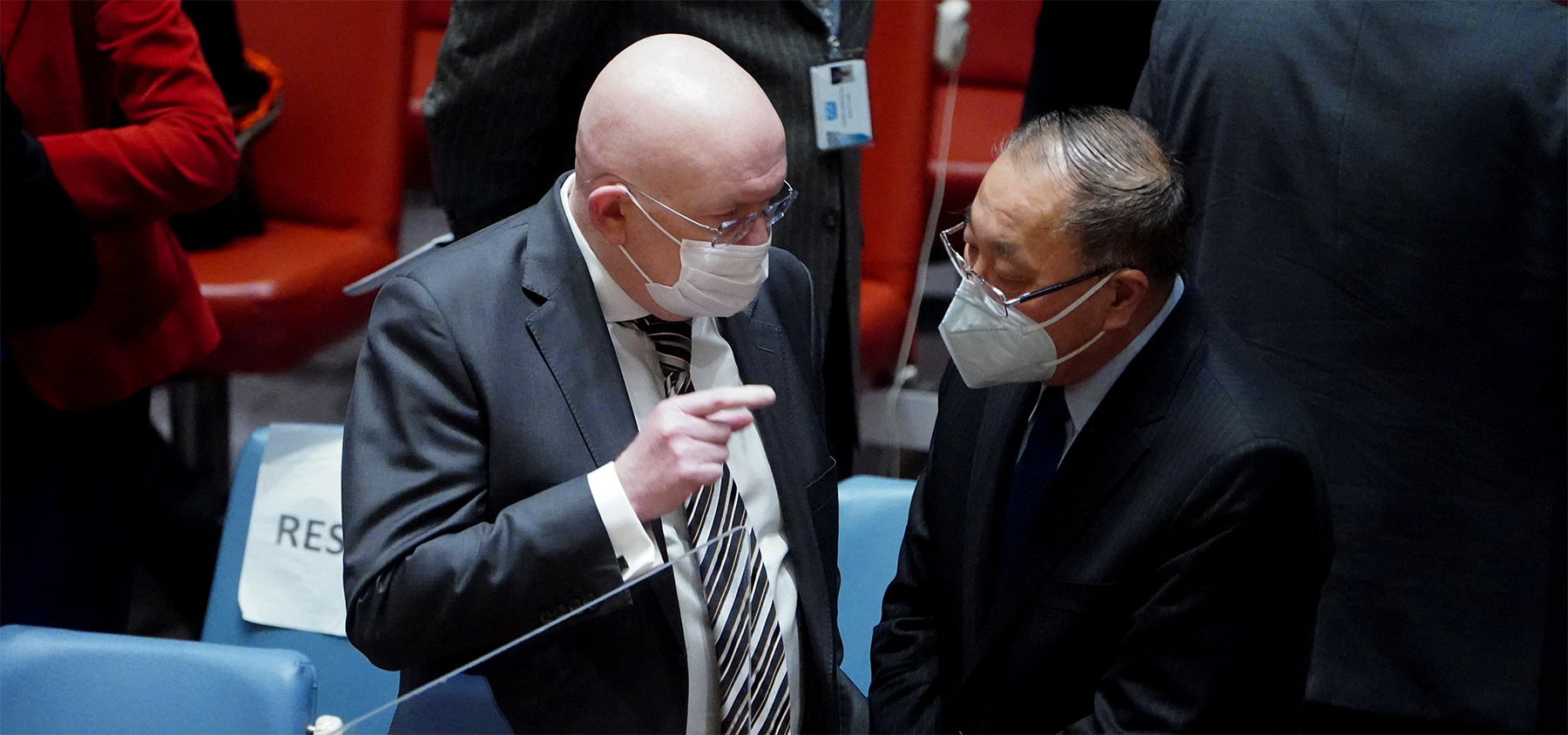Russia plays a key role in Kyrgyzstan’s foreign policy. All-in-all, relations between the two nations can be described as stable despite occasional political upheavals in Kyrgyzstan, which result in national leadership reshuffle. Cooperation between the two nations is multidimensional and strategic. This was emphatically stressed by the two leaders on the sidelines of the SCO summit in September 2022. Kyrgyzstan is a member of most regional integration associations where Russia is involved, be it political, trade-economic (CIS, EEU, SCO) or military-technical (CSTO). It is no coincidence that Mr. Zhaparov paid his first foreign visit as head of state, in February 2021, to Russia.
Kyrgyzstan’s restrained reaction to the Russian-Ukrainian conflict is due to the secondary nature of this issue for Kyrgyz foreign policy. The Russian-Ukrainian track had never before been among the priorities on the Russian-Kyrgyz agenda. Regional security headaches, especially tense relations with Tajikistan, appear to be a lot more important for Bishkek – in September 2022, there was another inter-state clash of arms on the border. For both Kyrgyzstan and Tajikistan, the border situation is a weighty, if not systemic, factor on the domestic political agenda.
The import-oriented nature of the Kyrgyz economy, its high dependence on remittances from outside, low production capacity, regional and ethnic contradictions, the acute border issue with Tajikistan, and limited logistics capabilities encourage Kyrgyzstan to avoid sharp angles in its relations with Russia, in spite of the fact that the Kyrgyz Republic has been under significant pressure from the United States to formulate its attitude to the conflict since the start of the SMO. Economic expediency bars Kyrgyzstan from aggravating its relations with Russia, but given the need to make choices, the country also seeks to maximize gains from the development of alternative contacts. Russia, despite its shrinking cultural and humanitarian opportunities, is still high on the Kyrgyz foreign and domestic policy agenda, as a guarantor of regional security as well as most stable and full-fledged economic partner for Kyrgyzstan. In the present-day environment, Kyrgyzstan is increasingly often forced to balance between different centers of power, having limited time for decision-making or taking sides. Moreover, the opportunities to sit on the sidelines are fewer and farther between. Under these circumstances, a logical reflex is making good use of accumulated experience as well as increasing the knowledge and skills by “learning” from better prepared partners. Russia has notable advantages in responding positively to this aspiration, starting with the EEU venues and ending with Kyrgyzstan’s traditionally keen interest in Russia. Yet, these are just favorable conditions that require systematic development and mutual willingness on both sides.
Seemingly, the relations between Russia and Kyrgyzstan have not changed since the commencement of Russia’s special military operation (SMO) in Ukraine. Kyrgyzstan continues to emphasize the importance of its strategic alliance with Russia, whereas the Russian leadership accentuates the significance of the Kyrgyz Republic (KR) in trade, economic and security issues.
Meanwhile, Kyrgyz President Sadyr Zhaparov was almost the only head of state in Central Asia who, in the first days of the SMO, gave his take on what was happening, which the Russian presidential press service assessed as solidarity with Russia. At the initiative of the Kyrgyz side, Vladimir Putin and Sadyr Zhaparov had a telephone conversation on February 26, during which, according to the Russian side, support was expressed for Russia’s actions in Ukraine. In response, the Ukrainian ambassador to Kyrgyzstan was recalled to Kiev for consultations. A few days later, Mr. Zhaparov had to publicly clarify his words. Speaking in the Kyrgyz parliament, he stated Kyrgyzstan’s neutral status in the Russian-Ukrainian conflict, mentioning that Kyrgyzstan had no capabilities to influence its outcome in any meaningful way.
Russia plays a key role in Kyrgyzstan’s foreign policy. All-in-all, relations between the two nations can be described as stable despite occasional political upheavals in Kyrgyzstan, which result in national leadership reshuffle. Cooperation between the two nations is multidimensional and strategic. This was emphatically stressed by the two leaders on the sidelines of the SCO summit in September 2022. Kyrgyzstan is a member of most regional integration associations where Russia is involved, be it political, trade-economic (CIS, EEU, SCO) or military-technical (CSTO). It is no coincidence that Mr. Zhaparov paid his first foreign visit as head of state, in February 2021, to Russia.
In the meantime, it’s worth noting that it was in Kyrgyzstan that most eye-catching political actions both in support and against the special operation took place after the SMO’s onset. The rallies were mainly held at the walls of the Russian embassy, and the authorities, in order to fend off any charges of bias or an itch for backing one of the parties to the conflict, banned such activities. Concurrently, the SMO emblems were banned in Kyrgyzstan, as well as documentaries highlighting the Donbass plight.
In this sense, Kyrgyzstan and Kazakhstan were the only countries in Central Asia where the discussion of the special operation was not declared taboo, and there was public debate that was far from being reclusive. After the nations of Central Asia gained independence, it is Kyrgyzstan that has demonstrated the highest remonstrance potential which led to several coups d’état, among other things.
It is worth noting that Kyrgyzstan, like other states of this region, has not been spared a wave of bogus stories about the possibility of its citizenry participation in combat operations unfolding in the territory of Ukraine. After the announcement of mobilization in Russia on September 21, 2022, these rumors redoubled, especially given the fact that many Kyrgyz citizens have dual Russian-Kyrgyz citizenship.
Kyrgyzstan has a relatively well-developed non-governmental sector, which is stronger than elsewhere in Central Asia. Many local NGOs receive Western funding and stand for looser ties with Russia, down to exiting the EEU and the CSTO. It is their activists who often condemn Russia’s policies. Kyrgyzstan expressly refuses to burn bridges behind its relations with Ukraine, focusing on close economic, cultural and humanitarian ties with the country.
The cautiousness of the Kyrgyz leadership on the Ukrainian issue can be explained by several factors. First, the high dependence of KR on Russian economic aid. The bilateral Russian-Kyrgyz agenda is mainly focused on issues of trade, economic cooperation and regional security.
Kyrgyzstan’s importance to Russia is determined by the prospects of maintaining the Russian presence in Central Asia against the backdrop of China’s growing economic and infrastructural influence, the U.S. military and political fast tracking in the region, opportunities for economic projects in the KR mining industry, export destinations (primarily, the supplies of fuel and lubricants, as well as metals, wood, agricultural products), regional security issues, and strengthening cooperation along integration tracks, especially in the EEU. Russia is the second largest investor into Kyrgyzstan’s economy next to China, and Russian investments in the first half of 2022 increased 3.5 times year-on-year. During the SMO, Russian and Kyrgyz officials have held several meetings, while the heads of state have met twice, at the CSTO summit in Moscow and at the SCO summit in Samarkand.
Kyrgyzstan finds itself in a difficult economic situation for several reasons. Among them is intra-elite disunity which, given the heated passions in society, heightens the risks of political instability; add here weak economic potential, difficult geographical conditions hampering transportation services, high unemployment rates and dependence on Chinese re-exports. Regional contradictions between the conventional North and South also play a destabilizing role.
Despite frequent power shifts, the Kyrgyz leadership has sought to formulate a relatively balanced Russian foreign policy, being aware of Russia’s paramount role in ensuring economic stability of the Kyrgyz Republic. Current President Zhaparov, who took the lead as a result of another coup d’état, demonstrates his willingness to keep up this trajectory, signaling his neutrality in relation to the Ukrainian crisis. Thus, Kyrgyzstan voted against the exclusion of Russia from the UN Human Rights Council at the UN General Assembly, as Zhaparov has repeatedly underlined that Bishkek proceeds from the need to respect the Minsk agreements supported by the UN.
Kyrgyzstan’s economy is import-oriented, with its domestic production on the wane. Farm produce is a significant export item for Kyrgyzstan, yet crop delivery to the most attractive Russian market is complicated by a long logistics leg and occasional violations of EEU phytosanitary standards. According to Kyrgyz statistics, exports in the first half of 2022 stood at USD 1.074 billion, while imports to the Kyrgyz Republic reached USD 4.976 billion. At the same time, during the same period of 2021, export transactions amounted to USD 1.693 billion, with imports estimated at USD 2.929 billion. As can be seen from these stats, trade balance has significantly sagged during the year, signaling unfavorable trends in Kyrgyzstan’s economy. Despite the Kyrgyz leadership’s efforts to diversify foreign economic ties, it is Russia that remains Kyrgyzstan’s key trade and economic partner, ahead of China (in terms of imports) and Kazakhstan (in terms of exports).
Kyrgyzstan is also among the top three Central Asian nations by the number of labor migrants entering Russia, and this figure has markedly increased during the past year. As of the summer 2022, the number of Kyrgyz migrants registered in Russia stood at 516,000, and most of them came to Russia to earn money. In 2021, the number of migrants registered for the same period (January-June) was 464,000, i.e., the number of entrants has grown. This indicates the burgeoning demand for the Russian labor market and the willingness of Kyrgyz citizens to moonlight in Russia in spite of the SMO and the accompanying economic grievances. Furthermore, Kyrgyzstan is a member state of the EEU, which endows Kyrgyz citizens with equal rights with blue collars from the Eurasian Five. Soft migration policies and relatively affordable labor infrastructure keep Russian destinations attractive for earning money, reducing the risks of social explosion in Kyrgyzstan.
According to the National Bank of the Kyrgyz Republic, remittances of individuals from Russia to the Kyrgyz Republic via the transfer system are the absolute maximum among all monetary funds transferred from abroad in this way. The National Bank of the Kyrgyz Republic reports that, as of July 2022, remittances of individuals from Russia amounted to USD 2.59 billion. This figure is significantly higher than the outflow from the Kyrgyz Republic. Moreover, the same statistics reveals that this figure has increased multiple times since the beginning of the SMO, meaning that stabilization of the ruble in the domestic market of Kyrgyzstan has led to a significant increase in remittances. The accelerated pace of construction in Russia amidst inflation expectations, as well as the recovery of the Russian labor market after the lifting of COVID restrictions, also played their role.
These indicators show Kyrgyzstan’s persistent dependence on Russia and unwillingness of the Kyrgyz political elite to strain relations with its key trade and economic partner.
Second, Kyrgyzstan’s restrained reaction to the Russian-Ukrainian conflict is due to the secondary nature of this issue for Kyrgyz foreign policy. The Russian-Ukrainian track had never before been among the priorities on the Russian-Kyrgyz agenda. Regional security headaches, especially tense relations with Tajikistan, appear to be a lot more important for Bishkek – in September 2022, there was another inter-state clash of arms on the border. For both Kyrgyzstan and Tajikistan, the border situation is a weighty, if not systemic, factor on the domestic political agenda. Both nations are CSTO members, and despite occasional public discussions about the need to withdraw from this structure, they hold to their membership. Despite the desire of both Kyrgyzstan and Tajikistan to diversify their foreign policy, Russia is still perceived as a priority guarantor of regional security by both.
Third, Kyrgyzstan’s emphatic neutrality is due to the national leadership’s fear of falling under secondary sanctions by Western countries, primarily the United States. Once the SMO began, U.S. officials have markedly intensified contacts with Central Asian elites, both in military and economic cooperation areas. In September 2022 alone, several quite eloquent statements were made that directly indicated the U.S. administration’s desire to weaken Central Asia’s current economic and social ties with Russia. For example, U.S. sanctions policy coordinator James O’Brien said that the United States has started working with countries in the region to find alternative routes for goods from Central Asia to foreign markets, bypassing Russia, while Anjali Kaur, Deputy Assistant Administrator of the U.S. Agency for International Development for Asia, warned that the United States sees its goal in disengaging Central Asian economies from Russia. U.S. Secretary of State Anthony Blinken and the foreign ministers of Central Asian countries, including Kyrgyzstan, met on the sidelines of the UN General Assembly in New York within the C5+1 format. The first meeting since the SMO’s commencement took place online in February. It is important for the U.S. leadership to clarify the attitudes of regional political elites toward Russia’s actions in Ukraine and to identify possible points of return to the region, given the escalation of the Russian-Ukrainian conflict to armed standoff.
U.S. representatives have repeatedly visited Kyrgyzstan to meet with the national leadership. During this period, the U.S. Under Secretary of State for Civilian Security, Democracy and Human Rights Uzra Zeya and Assistant Secretary of State for South and Central Asian Affairs Donald Lu paid their visits to Kyrgyzstan.
The U.S. has significantly narrowed the opportunities for countries in the region to trade with Russia, threatening to scale up sanctions. A joint warning by the Financial Crimes Enforcement Network (FinCEN) and the U.S. Department of Commerce’s Bureau of Industry and Security lists Kyrgyzstan, along with other countries in the region, as a likely transshipment point for sanctioned goods to Russia, which means it is subject to greater scrutiny by the U.S. administration. In the meantime, the U.S. is considering the possibility of signing a new military agreement with Kyrgyzstan up to the placement of a military base in its territory, and so the U.S. diplomatic activity in the Kyrgyz Republic and the region as a whole will be on the rise. All the more so, because the U.S. already has a short, but rather eventful background of its armed forces in Kyrgyzstan due to the Manas Air Base, once used as a transit center for the U.S. military presence in Afghanistan. In 2014, the U.S. withdrew from the airbase at the insistence of the Kyrgyz side.
Finally, with the notable exodus of many companies and individuals from Russia as part of relocation, Kyrgyzstan stakes on co-opting repatriates into its labor market. As elsewhere in the region, the focus is on Kyrgyzstan’s underdeveloped IT sector. Within its programs of attracting foreign expertise, the Kyrgyz government has taken a number of measures aimed at easing integration conditions for returnees. Among them are tax vacations, simplified registration procedures, and other efforts to minimize bureaucratic barriers for foreigners, called the Digital Nomad program.
***
The import-oriented nature of the Kyrgyz economy, its high dependence on remittances from outside, low production capacity, regional and ethnic contradictions, the acute border issue with Tajikistan, and limited logistics capabilities encourage Kyrgyzstan to avoid sharp angles in its relations with Russia, in spite of the fact that the Kyrgyz Republic has been under significant pressure from the United States to formulate its attitude to the conflict since the start of the SMO. Economic expediency bars Kyrgyzstan from aggravating its relations with Russia, but given the need to make choices, the country also seeks to maximize gains from the development of alternative contacts. Russia, despite its shrinking cultural and humanitarian opportunities, is still high on the Kyrgyz foreign and domestic policy agenda, as a guarantor of regional security as well as most stable and full-fledged economic partner for Kyrgyzstan. In the present-day environment, Kyrgyzstan is increasingly often forced to balance between different centers of power, having limited time for decision-making or taking sides. Moreover, the opportunities to sit on the sidelines are fewer and farther between. Under these circumstances, a logical reflex is making good use of accumulated experience as well as increasing the knowledge and skills by “learning” from better prepared partners. Russia has notable advantages in responding positively to this aspiration, starting with the EEU venues and ending with Kyrgyzstan’s traditionally keen interest in Russia. Yet, these are just favorable conditions that require systematic development and mutual willingness on both sides.







